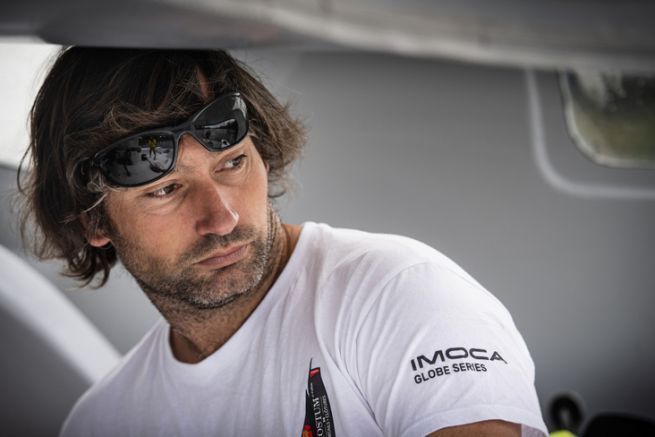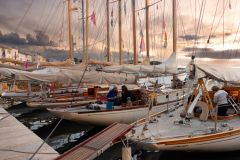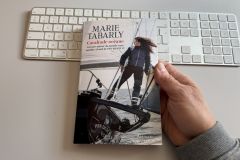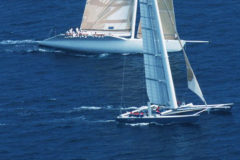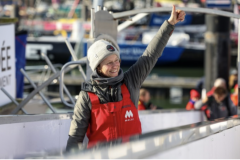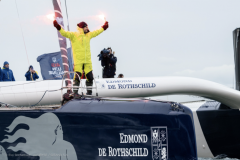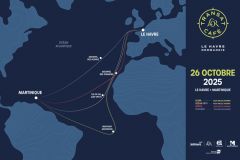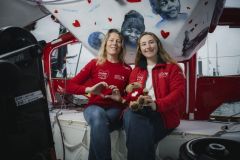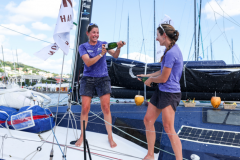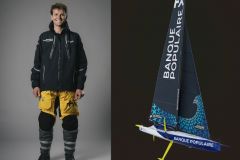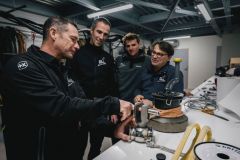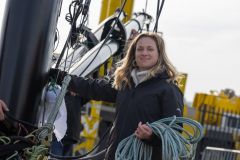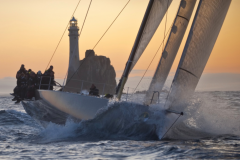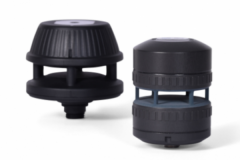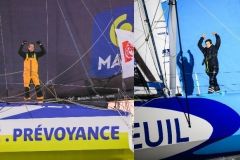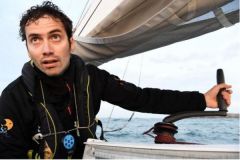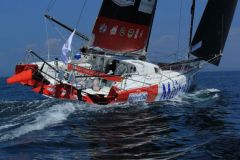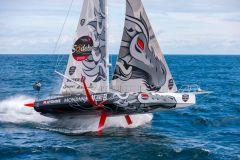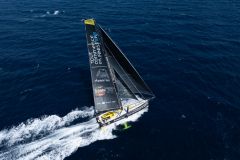With less than a month to go, what is your state of mind?
We are jubilant. With Marie (editor's note: Tabarly, his co-skipper), we feel very lucky to be able to make this start. This is my 6th start and it's different every time. But this time, it's a different taste because a year ago nothing was done. We haven't sailed much, but we have a boat ready. Six months ago I told myself that being at the start of the Jacques Vabre would be a real victory. We made it to the finish! It's my first experience in IMOCA so the objective is to gain experience, have fun and come back with a huge list of modifications to do on the boat!
You've just joined the IMOCA circuit after the Class40, why did you make this choice and what are your ambitions in this Jacques Vabre?
I had a good time in Class40. I made my debut in 2007 with some interruptions. I participated in my first Jacques Vabre in 2007. And again in 2008. During this period, the class evolved and new boats were launched, including mine. The architects made choices in terms of innovation and performance. I participated in the design of the Lift40 Carac, with the Lombard group. It won the Route du Rhum in 2018 in the hands of Yoann Richomme, who reused our mold to produce an even more accomplished boat. I had a breakdown during the race. It was still great that the boat we designed won. We made it to the end, even if I would have liked to win a transatlantic race.
In 2019, I had an accident and lost my boat. I had a big questioning: stop the project? Do something else than ocean racing? Continue to sail?
I got the insurance money back, but that didn't allow me to launch a new boat. But I had enough to create a story. I had this idea in my head. For years, solo racing has been my passion. Sailing in difficult conditions is fun for me.
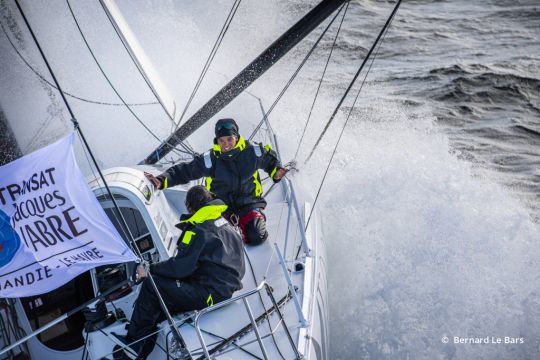
You bought Clément Giraud's IMOCA Fortil, which was involved in a fire before the start of the Vendée Globe. Can you present it to us and explain your choice?
Fortil was the owner of the boat. When the boat arrived in Caen, it was dismasted, put in the dry and cleaned from the inside so that it could be appraised. We bought it, took it apart and put it in the yard. We dismantled everything to see what worked and what didn't. From the looks of it, it could have some damaged things - electronic circuit, pilot's computer, power plant - but that could be saved. We tested everything to know what we were keeping, what we were tinkering with or what we were throwing away. And finally, we saved a lot of things!
By adding 30% of the material that was there, we are ready to race today: hydraulics, electronics, fittings. The boat burned so the roof was delaminated, as was the mast bulkhead. We looked to see if the boat had moved in terms of structure and shape. We went further than what was visible by coring with an expert to determine which areas needed to be cleared and which areas could be saved. The outrigger bulkhead was burned to 2/3, but the lower part was still healthy for example. We tried to save a maximum of things.
We approached the Lombard firm to make some modifications before the repairs. Eric Levet redesigned the boat. We moved the weights back. This is the sistership of Jean Le Cam's boat. So we contacted him to find out his philosophy and we did the same. We moved the engine back, modified the layout of the ballast tanks, reinforced the bottom of the hull... From the outrigger bulkhead to the watertight bulkhead, she is new. We also kept some things to do for later. We had a maximum budget for repairs and it worked out well.
It was one of the first times I didn't have my hands in the work. I let the Lombard firm and my team manage it. I went hunting for funding . It was a big adventure to restart the construction of the boat with these modifications.
Then we had to find another 100,000 euros - in addition to the 200,000 euros we had already injected into the project to repair and run. We created the project " Your savings around the world "This is a kind of loan between private individuals, up to 1,000 euros per person, with an interest rate of 2%. In August, we launched a ready boat.
If the work was assured, the financing for the race was missing. At the end of March, Marie called me. She liked my project, corresponding to her philosophy. She offered to help me find financing before asking me if I was going to participate in the Jacques Vabre. If it was possible technically, it was impossible financially. So we gave ourselves 3 months to find the operating budget. We found a first partner, Lantana Paysages, who brought 40% of the budget. We also formed a club of partners who brought a small budget.
I then met Emmanuelle Cadiou, the president of Cadiou Industrie (Kostum by Cadiou) who joined us at the end of July 2021. We had set ourselves a deadline of mid-July to know if the financial budget would allow us to participate in the Jacques Vabre or not. And finally, we had 15 more days.
We managed to put the boat in the water, to sail, to qualify and to feel comfortable.
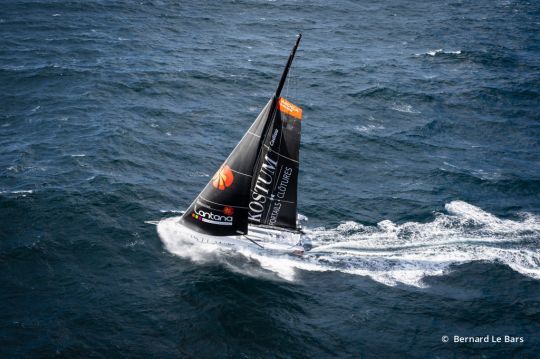
Can you tell us about Marie Tabarly who you chose as co-skipper ?
At the beginning, Marie only wanted to help me in my search for financing. The idea was not to run together. But in the end the story fits. We have the same passion for boats and the sea. It is not common for all runners to be born around the sea and boats. We both lived around water and we have this common passion. We both see the rebirth of this boat with the eyes of a child. I liked Marie's message, this benevolent side of the character. She has also sailed a lot in regattas on big boats. She has a lot of offshore experience too. And an enormous sense of seamanship.
I raced a lot in the Jacques Vabre and the Route du Rhum. I know the courses well, the starts. She knows the big boats well. I'm used to the technical parts.
In this project, everything fits. It's great. We've done the hardest part: setting up a project, finding money, getting along with the press and sponsors. You can often get into arguments on a double-handed race, but with Marie it's smooth. In all crews there can be tensions.
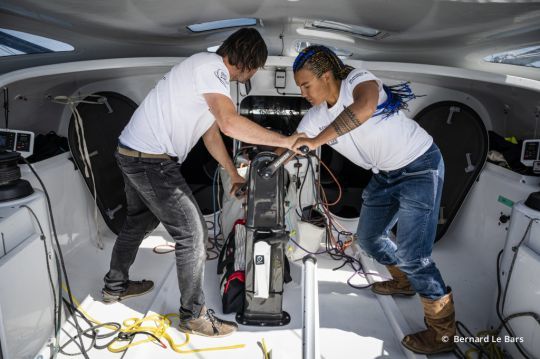
What are the constraints and advantages of a double-handed race format compared to solo or crewed racing?
The double I think it's a great format. I would have gone solo right away, but in this case it's more fun to be with two people. There will be some technical work on the boat. We'll also be maneuvering together. In solo sailing, the preparation is draconian. Here, it's easier to climb the mast. The crew is less my thing. On the other hand, the double-handed format leaves room for freedom, as there is a lot of solo sailing. When you are solo, you take things alone. In terms of safety, double-handed sailing is not bad either.
It's a very specific format, but nice when it goes very well with the person.
What do you think of the new race courses? What will it change?
The 2/3 is the same as before. It's exactly the same as going to Brazil. We are working a little bit on the weather patterns, but for the moment we don't have much.
What changes is the return journey from Fernando de Noronha to Martinique with difficult coasts, fishermen, difficult conditions with thermal effects and UFOs. We will also have to cross the doldrums a second time. Normally, the further west you go, the better, because it is more active in the east. This 2nd part is a part of unknown. The trade winds are easy to manage and so are the tropical phases that I know well.
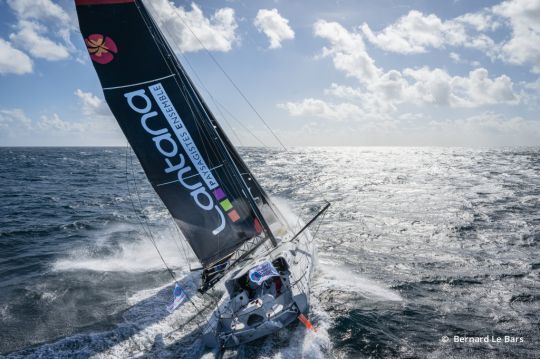
How do you feel about the competition, both in personal and material terms (boat)?
There are 45 Class 40s in the Transat Jacques Vabre, including many new boats. I like this class and I watch it very closely. With Covid, we said it was going to be hard for ocean racing and difficult to find partners. But the development is great!
In the IMOCA class, after the Vendée Globe, it's often a bit of a slow year. But here we have 22 boats at the start. The class has worked hard on the fact that the boats must have sailed before the Vendée Globe and it's a good decision to avoid haphazard preparations. It allows you to know your boat better, and to have a higher level of performance over the whole fleet. The differential between the first and last boats will be smaller.
The fact that my boat is old is great. Just because you have an old boat doesn't mean that it's a trash boat, that you just want to have an adventure. You can also play the performance game. We've seen some great examples. Pip Hare who had a great race, Le Cam who could have won the Vendée Globe if he hadn't had his problems, Damien Seguin on Apicil, with a boat that was less efficient and was almost 3 e just after Cape Horn. It's a nice surprise. The secret is that they worked a lot on their boat, with a lot of added value.
I would like to arrive like this in 3 years. With a boat that we know, that has been modified and repaired. On which I have sailed a lot. I'm going to play with my tools as best I can.
After the Transat Jacques Vabre, what are your plans?
It will be very active. We're going into construction at the end of December for 3 months. We're going to make some changes to the drift, the orientation plans and gain weight. We already have gains to make in many areas that we were not able to make before.
We will continue to hunt for partners. After that, it will be the Bermuda 1000, the Vendée Arctique, and the Route du Rhum 2022 in which I would like to be present. My goal is to have a boat ready and to sail the maximum number of miles. The Jacques Vabre will help me prepare the boat for the solo race.
